What is OMRON?
OMRON Corporation is a global automation equipment manufacturer headquartered in Kyoto, Japan. Founded in 1933, OMRON operates businesses in areas such as automatic control equipment, electronic components, and medical equipment. In particular, in the medical equipment field, OMRON have a high share of health-related products such as home blood pressure monitors and thermometers. We also offer a wide range of factory automation technology products, including sensors, relays, switches, and control systems, which are widely used in industry.
Analysis of OMRON
- Innovation and technological strength
- Wide range of products
- Global business network
Innovation and technological strength

Omron is contributing to solving social issues by integrating technologies for sensing, controlling, thinking, and acting. The company’s research and development focuses on cutting-edge technologies such as AI, IoT, and robotics, and it holds many patents in these fields. OMRON’s technological capabilities are the basis for producing high-quality products and are an important factor in earning the trust of our customers.
Wide range of products

OMRON offers a wide variety of products, including industrial automation equipment, electronic components, and medical equipment. This diversity gives OMRON the strength to respond to different markets and customer needs, and has the effect of diversifying the risk of economic fluctuations and downturns in specific markets. Especially OMRON is good at sensors and control equipment.
Global business network

Omron has offices and sales networks all over the world, and conducts business from a global perspective. This global footprint strengthens our ability to expand into emerging markets and address local customer needs.
Market Position
According to Omron’s 2019 integrated report, the company boasts high market shares in various business fields and has a wide range of product lineups. Below are our main business areas and their characteristics.
Control equipment business (IAB)
Control equipment-related market share in Japan is approximately 40%, and our products include safety light curtains, fiber sensors, and programmable controllers.
In terms of sales composition, output + robots account for 11%, input accounts for 37%, and mobile robots, logic, etc. account for 52%.
Electronic components business (EMC)
The world share of relays is approximately 20%, and relays, switches, and connectors account for 77% of sales.
Automotive business (AEC)
The domestic market share of body control units for light vehicles is approximately 20%, and the product group also includes other switches and motor controllers.
Source: OMRON Global
Outlook
OMRON’s success does not simply depend on its technological capabilities. Each of these strengths explains why Omron has the flexibility to continue its long-term growth and adapt to changing market conditions and technological innovations. In particular, our diverse product portfolio and global reach enable us to spread risk and serve a diverse customer base. OMRON’s brand value also plays an important role in building strong relationships with customers and fostering customer acceptance of new markets and products. In this way, OMRON’s strengths complement each other, putting the company at the forefront of the industry.







